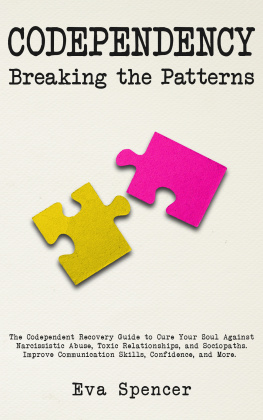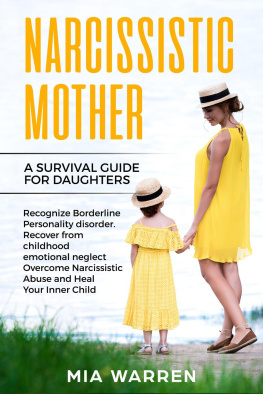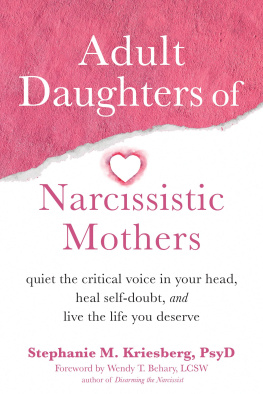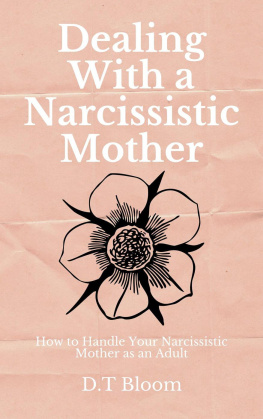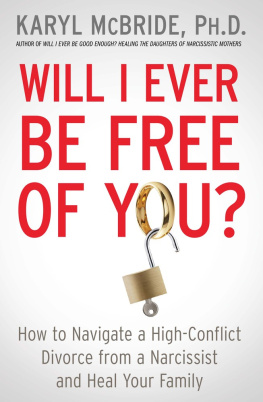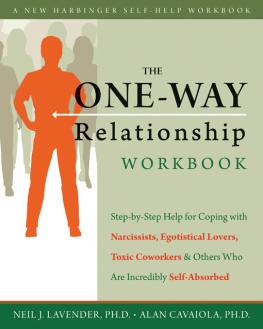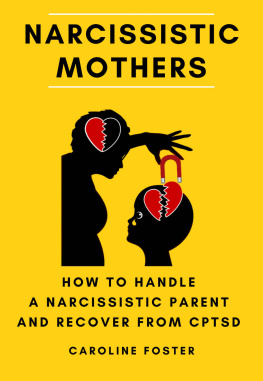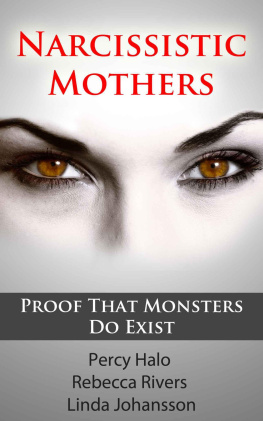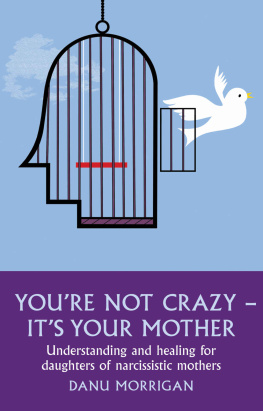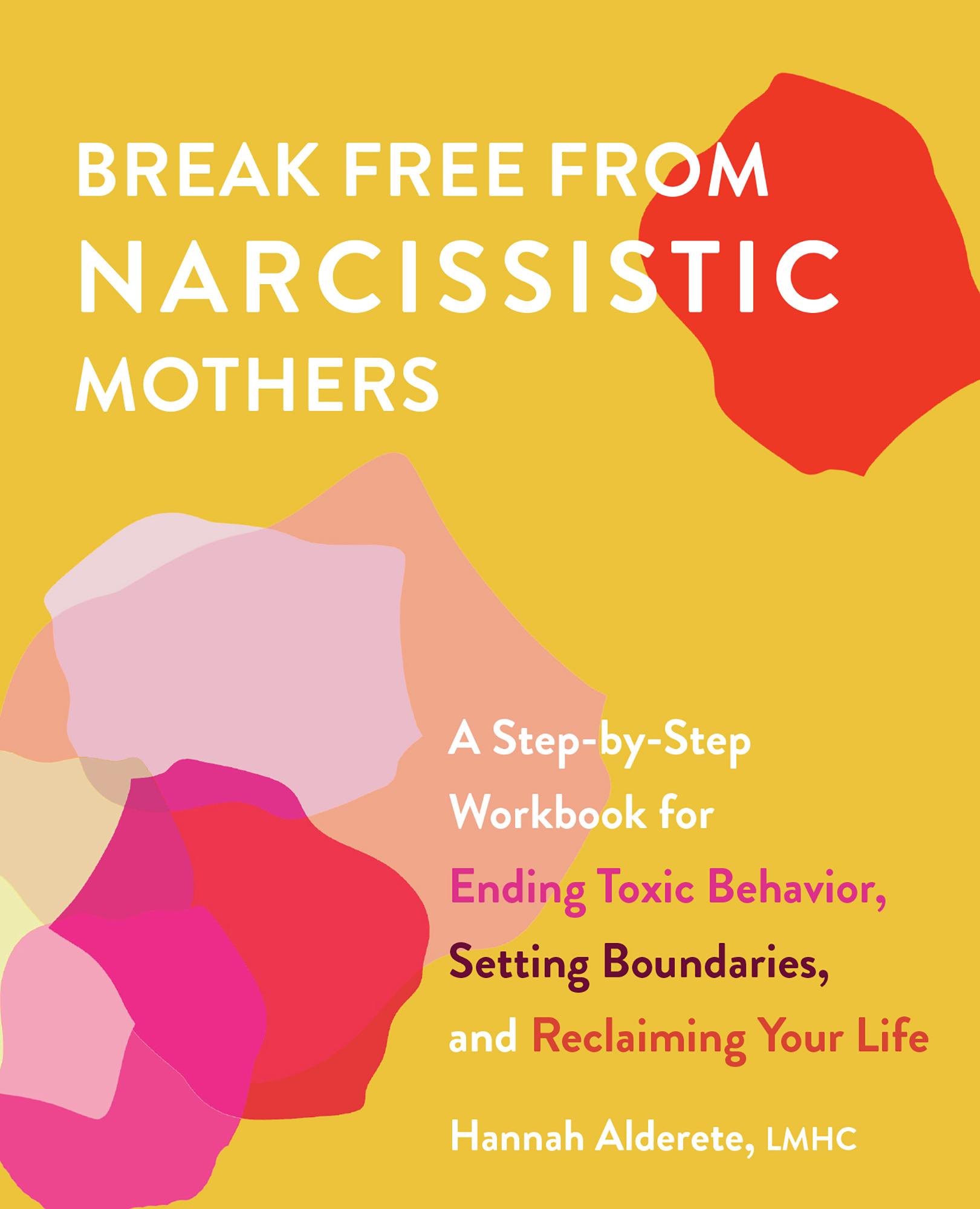Contents
Guide
Break Free from Narcissistic Mothers
A Step-by-Step Workbook for Ending Toxic Behavior, Setting Boundaries, and Reclaiming Your Life
Hannah Alderete, LMHC
Text copyright 2021 Hannah Alderete. Concept and design copyright 2021 Ulysses Press and its licensors. All rights reserved. Any unauthorized duplication in whole or in part or dissemination of this edition by any means (including but not limited to photocopying, electronic devices, digital versions, and the internet) will be prosecuted to the fullest extent of the law.
Published by:
Ulysses Press
PO Box 3440
Berkeley, CA 94703
www.ulyssespress.com
ISBN: 978-1-64604-255-5
ISBN: 978-1-6460-4285-2 (ebook)
Library of Congress Catalog Number: 2021937734
Acquisitions editor: Claire Sielaff
Managing editor: Claire Chun
Project manager: Renee Rutledge
Editor: Ariel Adams
Proofreader: Beret Olsen
Front cover design: Rebecca Lown
Interior design: what!design @ whatweb.com
Production: Jake Flaherty, Yesenia Garcia-Lopez
IMPORTANT NOTE TO READERS: This book has been written and published for informational and educational purposes only. It is not intended to serve as medical advice or to be any form of medical treatment. You should always consult with your physician before altering or changing any aspect of your medical treatment. Do not stop or change any prescription medications without the guidance and advice of your physician. Any use of the information in this book is made on the readers good judgment and is the readers sole responsibility. This book is not intended to diagnose or treat any medical condition and is not a substitute for a physician. This book is independently authored and published and no sponsorship or endorsement of this book by, and no affiliation with, any trademarked brands or other products mentioned within is claimed or suggested. All trademarks that appear in this book belong to their respective owners and are used here for informational purposes only. The author and publisher encourage readers to patronize the quality brands mentioned in this book.
To my kin: G, K, and M.
Chapter 1 WHY YOURE HERE
I think Im finally coming to terms with the fact that my mom may be a narcissist, said Mel in our first therapy session. A creative and flamboyant woman in her early forties with curly red hair and tattoos lining her arms, Mel had sought me out after an aha moment last spring, in which she could no longer deny the reality of her mother.
Honestly, I think I always knew, but something about this last round of spending time with her really jolted me awake. Mel told her mom that after five years of tirelessly working at her art gallery job as an assistant, she was finally recognized for her hard work and received the promotion of her dreams: to chief curator. Instead of giving her the hugs, praise, and celebration she had hoped for (but deep down knew she wouldnt get), her mother simply looked at her and said, Thats nice, honey, but I really cant hear about this right now. Ive got a headache, and walked off to her room, where she proceeded to lie down for a nap. Stunned, Mel walked out of her mothers home, got into her car, and just sat. She was swirling with all kinds of emotionsrage, sadness, disappointment, shockand yet felt as if the clouds had parted and she could finally see her mother for who she was: a narcissist.
When Mel and I explored her story further, we found countless times when her mother shamed Mel for an emotion, criticized her very normal needs as selfish, and batted away Mels boundaries as if they were made of gossamer. Examples of her mothers lack of caring ranged from, Do you really think youre good enough to sing? to I dont have time to listen to you cry, suggesting that Mels feelings were an imposition. Through repeated experiences like the ones above, Mel never got the sense that she mattered to her mother. Nor did she feel that her mother ever really knew her, which is a common experience shared among adult daughters of narcissistic mothers.
Mel noted that this revelation of her mothers narcissism was a long time coming, but what kept her from fully seeing the truth were the unhelpful beliefs she had taken in regarding mothers and daughters. I always felt that I should love my mom unconditionally, that thats what good daughters do, you know? I never got the sense that I was allowed to even consider what I needed in the relationship. For most of my life, my relationship with my mom was one where she mattered more than I did, and I could never just be her daughter that she loved unconditionally. There were countless conditions I had to follow just to get the bare minimum.
Other adult daughters of narcissistic mothers have shared very similar beliefs theyve unconsciously bought into about mother-daughter relationships. Ellen, a 29-year-old pharmacist, told me once, It never occurred to me that my mom was being abusive and controlling until I started talking about it. Ellen, like many adult daughters, learned early on to adapt to her mothers emotional insensitivity, neglect, and childlike tantrums. Over time, these adaptations became repeated behaviors that consistently put her mothers needs above her own.
When she awoke from this trance-like adherence to the often-toxic message that family is family no matter what, it was as if someone had finally turned on the light and she saw what she had been living in. She shared, It was one of those beautiful autumn days where the sky is neon blue and the suns warmth feels like youre wearing a weighted blanket. I was driving over to my moms house and all of the sudden I felt cold, as if a giant had blotted out the sun. My stomach got fluttery and cramped, and I thought I was going to be sick. When I pulled over to catch my breath and figure out what was happening, I realized that I was having a panic attack about seeing my mom. I was afraid that she was going to ruin this beautiful day with another one of her episodes where she basically rips apart my life choices in some form or another.
Ellen realized that she could no longer pretend that her relationship with her mom was fine or just mom being mom. Some dormant part in her began to awaken to the truth of what was happening. This healthy part of Ellen nudged her out of the belief system that was veiling the truth about her mother and finally helped her recognize the reality that something would need to change. That something would not be her mother, and this was when she knew she needed tools to support her own transformation.
Your story may not look exactly like Mels or Ellens, but youre in their experiences. They are you: a woman who is coming to grips with the reality of her mother. Whether youre just now realizing that your mother may be a narcissist, or have known your whole life and are no longer in contact, I hope to offer you a place in which you can be held, validated, and supported in your journey back to your self. We cannot give you a new mother, but we can give you a new relationship to all the parts of you that had to live underground during your formative years, and welcome them back home.
The Emphasis of the Book
This book is dedicated to you and to reality. We need both in order to take you out of the fantasy that narcissistic mothers live in and to bring you back into the truth of your feelings, needs, identity, boundaries, and aspirations. According to the



